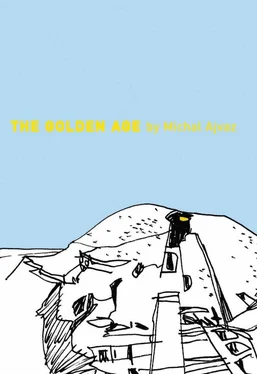Michal Ajvaz - The Golden Age
Здесь есть возможность читать онлайн «Michal Ajvaz - The Golden Age» весь текст электронной книги совершенно бесплатно (целиком полную версию без сокращений). В некоторых случаях можно слушать аудио, скачать через торрент в формате fb2 и присутствует краткое содержание. Год выпуска: 2010, Издательство: Dalkey Archive Press, Жанр: Современная проза, на английском языке. Описание произведения, (предисловие) а так же отзывы посетителей доступны на портале библиотеки ЛибКат.
- Название:The Golden Age
- Автор:
- Издательство:Dalkey Archive Press
- Жанр:
- Год:2010
- ISBN:нет данных
- Рейтинг книги:4 / 5. Голосов: 1
-
Избранное:Добавить в избранное
- Отзывы:
-
Ваша оценка:
- 80
- 1
- 2
- 3
- 4
- 5
The Golden Age: краткое содержание, описание и аннотация
Предлагаем к чтению аннотацию, описание, краткое содержание или предисловие (зависит от того, что написал сам автор книги «The Golden Age»). Если вы не нашли необходимую информацию о книге — напишите в комментариях, мы постараемся отыскать её.
is Michal Ajvaz’s greatest and most ambitious work.
The Golden Age
The Golden Age — читать онлайн бесплатно полную книгу (весь текст) целиком
Ниже представлен текст книги, разбитый по страницам. Система сохранения места последней прочитанной страницы, позволяет с удобством читать онлайн бесплатно книгу «The Golden Age», без необходимости каждый раз заново искать на чём Вы остановились. Поставьте закладку, и сможете в любой момент перейти на страницу, на которой закончили чтение.
Интервал:
Закладка:
After a while she spoke in a low voice. “We’ve got you at last. My ruse has succeeded; the queen will praise me. For months now I’ve been carving puppets from wood, for years I’ve been writing a play for the puppet theatre; I used up all the talent I have on this, my moments of purest inspiration, but now I no longer regret it. I hired the best puppet players and a boat whose crew I had schooled at the naval academy in Hamburg; I patiently trained the extras who played the audience. That’s right, this whole comedy was played out for your sake, it was part of our pursuit of you, which has been going on now for several decades on all continents. And it was well worth it: the queen will be delighted, she’ll burst into tears of joy, good, noble soul that she is. After all these years, justice has at last been done. It has been proven that everything must be atoned for. Now at last you shall receive your punishment, and the stars that burned red with shame will again be as pure as before. I bet you thought you’d be able to destroy all traces testifying to your guilt, but in this you overreached yourself: everything was kept in reserve, kept for this very moment.”
She took from the wall a painting of a sombre landscape, in so doing revealing the metal door of a safe. This she unlocked before carefully drawing from it a book, which she leafed through before holding it out open for me to inspect. I saw some geometric figures and formulae; in the white margin of the page there was a clumsy drawing of a battleship. It was all somehow familiar to me. Then I remembered. “That’s my geometry textbook from when I was in Year Five or Six. It was me who drew that cruiser in the margin during a lesson,” I said, astonished.
“A confession!” the woman exclaimed in triumph. “Not even I could have imagined it would go as smoothly as this! This forms only part of the charge, although it is serious enough in itself. He who sullies white paper with his drawings could demolish the temple and smash its marble statues; he could rip out the strings of the piano and leave them out in the evening wind to jangle a nonsense song about cities consumed by jungles; he could deny the existence of the stars and the great, beautiful beasts which thirst for flames, run to conflagrations and bathe in fire. This crime is enough to get you life imprisonment on the cold staircases of apartment buildings, staircases with handrails made of metal flowers; enough for a thousand-page novel to be written about you in which you spend your days in solitude in an apartment by the railway line, where deep within the dresser the cutlery rattles at night whenever a train goes past. Your guilt will suffice to have all the islands of the icy sea which bear your name renamed, or at the very least to have some of their sounds changed so that the islanders are incapable of remembering them; they will curse you and their fur-clad arms will gesture threatening in the direction of the place where you were born; they will use your name with derision to describe the evil walrus so that over time your name will become the natural-historical term for the walrus, a term which will survive into the age of happiness which is still many years ahead of us, an age when people will forget your crimes as they forget your existence. Is not the thought of this almost-certain future enough to persuade you to reflect on your despicable acts? Perhaps you are not yet altogether depraved. And as I’ve indicated, we know still more about you. Was it not enough for you to draw cruisers and Red Indians in the margins of the pages of books? ‘The more one has, the more one wants,’ as one of our highest-placed devotees pointed out recently at the dawning of the age in which the seals that had lain for centuries on the teachings of the East were removed. Let us see what you have to say about this.”
Again she leafed through the book before placing it in front of my eyes, now open at a page which bore a geometric representation of Thales’ theorem — a circle with a right-angled triangle inserted above the diameter; next to this I could see the clumsy, childish picture of a bear with a bow around its neck. Perhaps this, too, was one of my drawings, but I had no recollection of it.
“We wished to spare the queen the sight of this blasphemy,” my captor continued. “But she is a brave woman and she told us that as the mother of her people she had no right to evade even such awful tests as this. My God, how could you do such as thing? Surely you knew that it was she who assisted Thales in his discovery of the theorem, when amid the bathing beauties in the circular pool of the gardens of her palace in Asia she stretched and tightened the string of a musical instrument on which she had threaded pearls? A string which reached across the centre of the pool and touched the side at three places? The moment when silently she pointed out to Thales a great emerald which was glittering in the early-morning sun among the pearls, at the very point where the string made its right angle, is captured in many paintings and frescoes; pictures of the Demonstration — many of them touchingly artless — hang on the walls of the poorest cottages, immediately next to the Golden Snake, and the shepherds at their evening firesides sing songs of this bright moment in our history. But what did you think of when you saw the sacred figure? Did you think of the good name of the royal institute of geometry and those who run it? Did you think of the honour of the nation, of the glory of the dynasty, of the sufferings and hurt with which our history has been marked? No. You thought of a bear with a bow around its neck.”
Having said this the woman slid quietly down to the carpet, where she rested her sobbing frame against the commode. After a while she recovered herself somewhat, dried her eyes and stood up. “After the queen saw your picture of the bear,” she went on, “for many weeks she closed herself up in her chambers and allowed no one near her. Her only companion was her little dog. Then this dog fell gravely ill at the sight of its mistress’s suffering, and shortly thereafter it died. It was at this time that the people gave you the name Dog Killer. The dog’s body — which had been stricken with the most dreadful illnesses — was laid in a modest grave in the grounds of the chateau; from this grave there grew a plant with a poisonous yellow flower, whose breath killed the birds which flew over it and the gardener who tended to it. They say that the gardener’s ghost appears at night among dormant machines in factory halls. The yellow flower erodes and blinds mirrors in which it is reflected, and if someone thinks of it the neurons in his brain become so excited that a short circuit might result and the brain catch fire. This phenomenon, known as “burning brain syndrome,” was defined and interpreted by the queen’s court physician, my lover. His professional achievement is the more remarkable for his having been forbidden to imagine the yellow flower for the course of his researches; had he done so, his brain, too, would have ignited. He was given the Nobel Prize for his work; to begin with he was supposed to receive the Nobel Prize for Medicine, but the committee of the Swedish Royal Academy, a group of elegant, dark-complexioned young men with fine hands, decided to give him the Nobel Prize for Peace as he’d brought calm to many troubled souls; no longer does the ghost of the murdered gardener roam the factory halls at night in such a rage. At that time there was an uprising among the generals, who were against the queen giving up her overseas dominions. It had never been clear whether these were merely figments of a dream, or perhaps groups of divine spirits that were around at the time. One night the plotters broke into the palace, intending to murder the queen; then one of them suddenly thought of the poisonous yellow flower and his brain burst into flames. When the other plotters saw the flames flaring from his eyes and ears, lighting up the halls of the sleeping palace, reflected to infinity in the great mirrors, they fled. So it is thanks to you that the generals’ plot foundered: it was you who saved the queen’s precious life. She will never forget this; I had to promise her I would search the world for you so that she may express to you her boundless gratitude and bestow on you a bountiful reward. She asks you to come to her. She will make her beautiful sister, for whom the mightiest lords have given their lives, your wife. You will live in a palace, which the queen will have built for you opposite her own and which will be a mirror image of her own…”
Читать дальшеИнтервал:
Закладка:
Похожие книги на «The Golden Age»
Представляем Вашему вниманию похожие книги на «The Golden Age» списком для выбора. Мы отобрали схожую по названию и смыслу литературу в надежде предоставить читателям больше вариантов отыскать новые, интересные, ещё непрочитанные произведения.
Обсуждение, отзывы о книге «The Golden Age» и просто собственные мнения читателей. Оставьте ваши комментарии, напишите, что Вы думаете о произведении, его смысле или главных героях. Укажите что конкретно понравилось, а что нет, и почему Вы так считаете.












